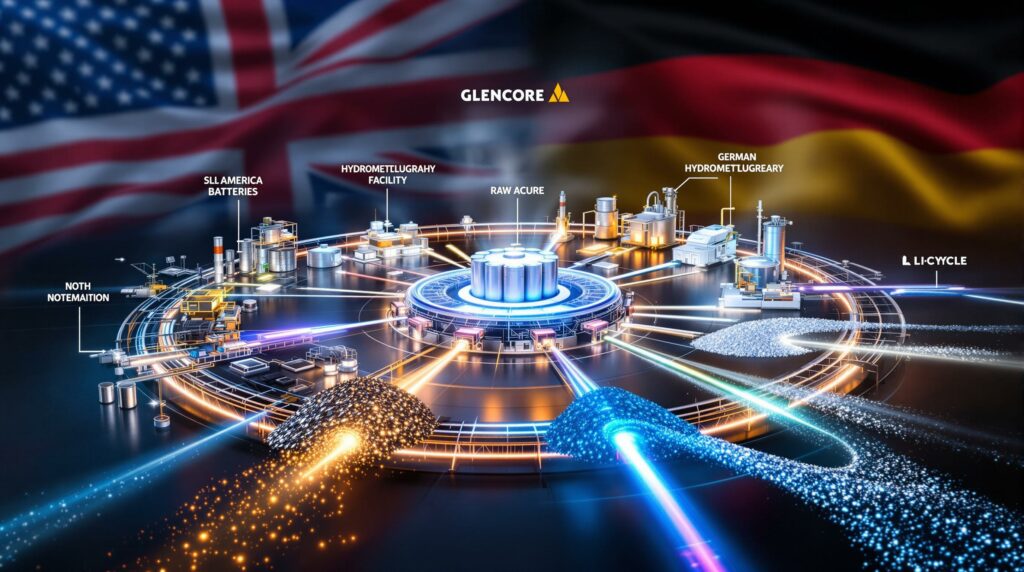The Strategic Acquisition: Glencore Takes Over Li-Cycle
In a significant industry move, Glencore has finalized its acquisition of Li-Cycle, marking a pivotal moment in the battery recycling sector. Completed on August 8, 2025, this strategic takeover represents a major consolidation in the circular battery economy, bringing together a global mining powerhouse with a specialized battery recycling technology company.
The Acquisition Framework
The deal includes four operational spoke facilities across North America, a significant spoke facility in Magdeburg, Germany (one of Europe's largest battery recycling plants), the Rochester hub project currently under development, and Li-Cycle's complete intellectual property portfolio.
From a financial perspective, Glencore secured the acquisition with an initial stalking horse bid of at least $40 million USD, after previously providing $10.5 million in debtor-in-possession financing. This acquisition follows Li-Cycle's May 2025 filing for creditor protection in both Canada and the United States.
"As of August 8th 2025, Li-Cycle has been acquired by Glencore Plc. We're excited for Li-Cycle to be part of Glencore and confident that this will bring continued value and enhanced service to our joint customers," stated Glencore in their official announcement.
The company has been immediately rebranded as Glencore Battery Recycling ("GBR"), signaling Glencore's commitment to establishing a stronger position in the battery recycling market.
Li-Cycle's Path to Acquisition
Li-Cycle's journey to being acquired began with mounting financial challenges that ultimately made the company seek a strategic buyer. The company officially launched its search for a buyer in March 2025, culminating in creditor protection filings across Canada and the United States by May 2025.
The financial troubles stemmed from several factors:
- Escalating operational costs across multiple facilities
- Significant project delays affecting revenue forecasts
- Construction issues with the critical Rochester hub
- Cash flow constraints limiting expansion capabilities
The Rochester hub complications proved particularly problematic. Construction was halted in November 2023 when total costs significantly exceeded the original project budget. This facility represented a critical component in Li-Cycle's business model, and its delay created severe liquidity challenges that ultimately led to the sale.
Industry sources indicate that negotiations between Glencore and Li-Cycle likely began even before the creditor protection proceedings, suggesting Glencore had identified the strategic value of Li-Cycle's assets and technology early on.
Understanding Li-Cycle's Technology Approach
What made Li-Cycle an attractive acquisition target was its innovative spoke-and-hub business model for battery recycling, which Glencore now controls.
The Spoke-and-Hub Model Explained
Li-Cycle developed a two-stage recycling process that efficiently recovers materials from end-of-life batteries:
Spoke Facilities: First-Stage Processing
The spoke facilities form the first stage in the recycling process and are strategically positioned near battery material sources to minimize transportation costs. These facilities:
- Perform mechanical processing of end-of-life batteries
- Extract primary materials including aluminum and copper
- Produce "black mass" containing valuable battery active materials
- Process up to 10,000 tonnes annually at the Magdeburg facility alone
The spoke facilities effectively serve as collection and initial processing centers, breaking down batteries into component parts and preparing the most valuable materials for further processing.
Hub Facilities: Advanced Material Recovery
The hub facilities represent the second, more technically sophisticated stage of the recycling process:
- Conduct hydrometallurgical recycling of black mass from spoke facilities
- Extract individual raw materials suitable for new battery production
- Function as centralized processing centers for material from multiple spokes
- Employ proprietary chemical processes to achieve high recovery rates
Li-Cycle's original strategic plan included a primary North American hub in Rochester, New York, and a European hub in Portovesme, Italy (in partnership with Glencore).
Geographic Footprint
The acquisition gives Glencore an impressive battery recycling network spanning two continents:
North American Operations:
- Three spoke facilities in the United States (Arizona, Alabama, New York)
- One hub facility under construction in Rochester, New York
- Two spoke facilities in Ontario, Canada
European Operations:
- Magdeburg, Germany spoke facility (operational since September 2023)
- Planned hub facility in Portovesme, Italy (previously a joint venture with Glencore)
The Magdeburg facility, which opened in September 2023, marked Li-Cycle's entry into the European Union market and can process up to 10,000 tonnes of battery material annually on its first processing line. As one of Europe's largest battery recycling plants, it represents a significant strategic asset in Glencore's expanded recycling portfolio.
Strategic Implications for Glencore
The acquisition significantly strengthens Glencore's position in the rapidly growing battery recycling sector, providing several strategic advantages.
Vertical Integration Benefits
By acquiring Li-Cycle's technology and facilities, Glencore has:
- Expanded its presence across the battery materials value chain
- Complemented its existing raw materials supply business
- Created a more complete circular economy offering
- Enhanced service capabilities for automotive and battery sector clients
This vertical integration allows Glencore to capture value at multiple points in the battery lifecycle, from raw material supply to end-of-life recycling.
Competitive Positioning
The acquisition positions Glencore as a leading player in battery recycling:
- European Market Leadership: Securing one of Europe's largest battery recycling operations gives Glencore significant capacity in a region with stringent recycling regulations
- Technology Acquisition: Gaining proprietary recycling technology and intellectual property provides competitive differentiation
- North American Expansion: Establishing a substantial North American recycling footprint creates a transatlantic presence
- Circular Economy Leadership: Positioning as a leader in the battery materials circular economy aligns with industry and regulatory trends
Customer Base Enhancement
Glencore's customer relationships now span a broader spectrum of the battery value chain:
- Automotive industry partnerships for end-of-life battery management
- Battery manufacturing clients seeking recycled materials
- Energy generation sector relationships
- Potential for expanded service offerings to existing customers
This expanded customer base creates opportunities for bundled services and strengthened industry partnerships.
The Acquisition Timeline
The path to Glencore's acquisition of Li-Cycle followed a clear progression of challenges and strategic decisions.
Pre-Acquisition Challenges
Li-Cycle's financial difficulties began to manifest publicly in late 2023:
- November 2023: Li-Cycle halts Rochester hub construction due to significant budget overruns
- March 2025: The company officially begins seeking a strategic buyer
- May 2025: Li-Cycle files for creditor protection in both Canada and United States
These financial challenges created the conditions for Glencore's acquisition opportunity.
Acquisition Progression
Once Li-Cycle was officially seeking a buyer, events moved relatively quickly:
- May 2025: Glencore secures stalking horse bid position with a minimum $40 million offer
- May-August 2025: Negotiations and due diligence period proceeds
- August 8, 2025: Acquisition officially completed
- Immediate: Operations rebranded to Glencore Battery Recycling ("GBR")
Glencore's Strategic Approach
Industry sources suggest Glencore approached the acquisition with careful planning:
- Negotiations reportedly began before Li-Cycle's creditor protection filing
- Glencore positioned itself as the preferred buyer due to existing creditor relationships
- The company moved quickly to secure assets before potential competitive bidding emerged
- Glencore leveraged its existing partnership on European hub development to strengthen its position
This strategic approach allowed Glencore to secure valuable battery recycling technology and infrastructure at a potentially advantageous price point.
The Strategic Importance of Battery Recycling
The acquisition highlights the growing strategic importance of battery recycling in the global energy transition landscape.
Industry Growth Drivers
Several factors are propelling rapid growth in the battery recycling sector:
Regulatory Frameworks
Regulatory requirements are increasingly mandating battery recycling:
- Growing battery recycling mandates across North America, Europe, and Asia
- Extended producer responsibility regulations placing recycling obligations on manufacturers
- Battery passport initiatives tracking materials through the value chain
- Circular economy policy frameworks prioritizing material recovery
These regulatory drivers create both compliance requirements and market opportunities for companies with advanced recycling capabilities.
Resource Security Considerations
Battery recycling provides strategic resource advantages:
- Reduces dependence on primary mining operations in geopolitically sensitive regions
- Secures access to critical battery materials like lithium, cobalt, and nickel
- Mitigates supply chain vulnerabilities from concentrated material sources
- Creates alternative material sourcing channels insulated from mining consolidation trends
For Glencore, which already has significant mining operations, recycling creates a complementary material source that enhances supply security.
Sustainability Imperatives
Environmental factors are increasingly driving recycling investment:
- Reduces the environmental impact of battery production by decreasing primary material needs
- Lowers carbon footprint compared to primary mining and refining activities
- Minimizes hazardous waste from improperly disposed end-of-life batteries
- Aligns with ESG expectations from investors, customers, and regulatory bodies
These sustainability advantages translate into both regulatory compliance benefits and marketing advantages for Glencore's customer relationships.
Future Outlook for the Combined Entity
With the acquisition complete, attention now turns to how Glencore will leverage Li-Cycle's technology and infrastructure.
Development Opportunities
Several potential development paths emerge from the combined entity:
Facility Expansion Potential
The acquisition creates opportunities for operational growth:
- Completion of the partially constructed Rochester hub facility
- Possible acceleration of European hub development in Portovesme, Italy
- Integration of operations for efficiency gains across the network
- Potential technology deployment across Glencore's broader global network
Given Glencore's stronger financial position, projects previously stalled under Li-Cycle may now proceed with renewed momentum.
Technology Enhancement
The combined company can advance recycling technology:
- Further development of Li-Cycle's intellectual property
- Process improvements through combined expertise in metallurgy and hydrometallurgy
- Scale advantages from Glencore's global operations and supply chain
- Enhanced research and development capabilities with greater financial resources
These technology improvements could increase recovery rates, reduce processing costs, and expand the range of recyclable materials. Furthermore, the company can build upon recent Chinese battery recycling breakthrough innovations to enhance their own technology stack.
Market Position Outlook
The acquisition strengthens Glencore's competitive position:
- Enhanced positioning in the rapidly growing battery recycling sector
- Potential for expanded service offerings combining raw materials and recycling
- Stronger relationships with automotive and battery manufacturing customers
- Improved capacity to meet growing recycling demand as electric vehicle adoption accelerates
As the electric vehicle market continues its rapid growth, Glencore is now better positioned to capture value from both the beginning and end of the battery lifecycle. The company's commitment to closed-loop battery recycling aligns with broader industry trends toward sustainability.
FAQs About the Glencore and Li-Cycle Deal
What was the purchase price for Li-Cycle?
While the final purchase price wasn't disclosed in public announcements, Glencore's initial stalking horse bid was at least $40 million USD, with an additional $10.5 million in debtor-in-possession financing provided earlier.
How many facilities did Glencore acquire in this deal?
Glencore acquired five operational spoke facilities (four in North America and one in Magdeburg, Germany), plus the hub project in Rochester and Li-Cycle's intellectual property portfolio.
What processing capacity does the Magdeburg facility offer?
The Magdeburg facility, which opened in September 2023, can recycle up to 10,000 tonnes of battery material annually on its first processing line.
What challenges led to Li-Cycle seeking a buyer?
Li-Cycle faced rising costs, project delays, and budget overruns at its Rochester hub facility, which created significant financial pressure and ultimately led to filing for creditor protection.
How does Li-Cycle's recycling technology work?
Li-Cycle uses a two-stage process: spoke facilities perform mechanical processing to extract primary materials and produce black mass, while hub facilities use hydrometallurgical processes to recover individual raw materials from the black mass.
Li-Cycle's Global Facility Network Acquired by Glencore
| Facility Type | Location | Status | Processing Capacity |
|---|---|---|---|
| Spoke | Arizona, USA | Operational | Not specified |
| Spoke | Alabama, USA | Operational | Not specified |
| Spoke | New York, USA | Operational | Not specified |
| Spoke | Ontario, Canada (2 facilities) | Operational | Not specified |
| Spoke | Magdeburg, Germany | Operational (since Sept 2023) | 10,000 tonnes annually |
| Hub | Rochester, New York | Construction halted (Nov 2023) | Planned for black mass processing |
| Hub | Portovesme, Italy | Planned partnership | Intended for European black mass |
Further Exploration:
Readers interested in learning more about developments in battery recycling can explore related content at Glencore's recycling division website, which offers additional perspectives on the evolving battery recycling landscape.
This Glencore and Li-Cycle acquisition represents a significant development in battery recycling infrastructure that will likely influence mining industry trends and energy transition strategies for years to come. As battery materials become increasingly critical to global supply chains, such vertical integration moves may become more common among major mining companies.
Want to Identify the Next Major Mineral Discovery?
Discover significant ASX mineral announcements as they happen with Discovery Alert's proprietary Discovery IQ model, giving you the edge to capitalise on transformative discoveries before the market catches up. Explore historic discovery returns and see how early investors have benefited at the Discovery Alert discoveries page.




